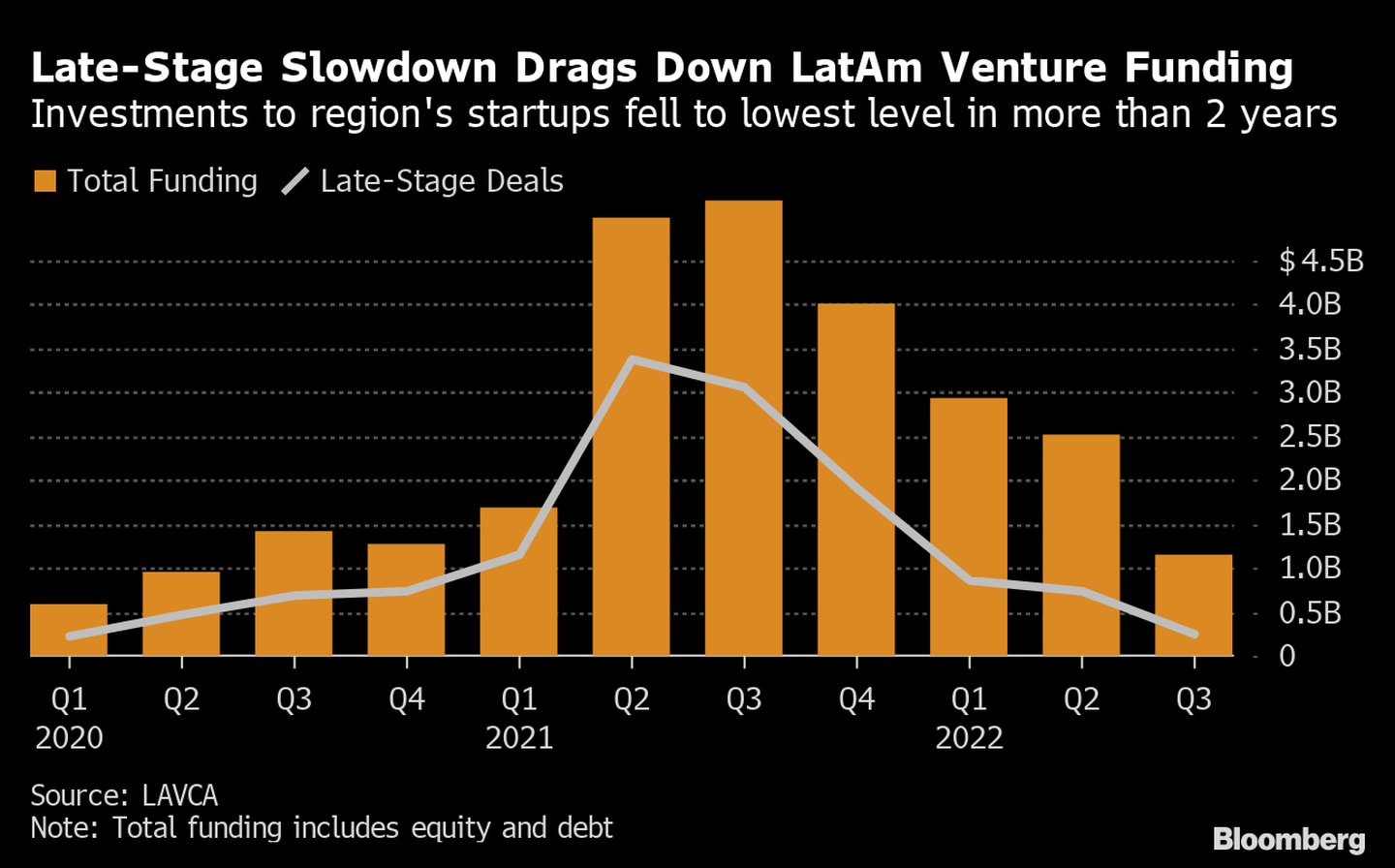By Ezra Fieser
The avalanche of venture capital that has flown into Latin American technology companies at an advanced stage in recent years has run out, forcing some of the most promising startups in the region to lay off staff, replan their growth plans and resort to bank loans to obtain financing.
After a series of record years in which investors created more than two dozen companies valued at US$1 billion or more, risk capital has practically disappeared for the most consolidated startups. Financing in the advanced stage dropped by 92% in the third quarter compared to the same period in the previous year, according to the Association for Private Capital Inversion in Latin America, LAVCA.
“I haven’t seen a growth round of a single Latin American company in months,” says Eric Reiner, founder and managing director of Vine Ventures LP, which opened a US$140 million fund this year for investments in Latin America, Israel and the US “When the capital runs out, investors become more sophisticated and selective. Many of these companies will have to demonstrate that they are real businesses”.

The slowdown follows a worldwide decline in risk capital investment, which is on the way to recording the biggest drop in more than two decades. In the case of Latin America, it took place just when the startup sector was taking off: at the beginning of this year, investors rushed to sign checks, generating oilcloths of fast-growing companies in all areas, from financial technology to this real estate sector.
In general, the risk financing for the region decreased in the last quarter by more than three quarters compared to the previous year, at US$1.15 billion, according to LAVCA.

The high inflation and the increase in interest rates have led to funds being reduced from the sectors with the greatest risk. Instead of carrying out investments based on growth projections, investors in risk capital claim that they want companies to demonstrate a clear path to obtain profits.
“I still think it’s reasonable to be optimistic about the region. But we have seen corrections. It is logical and natural, and reflects that investors demand that companies demonstrate profitability”, says Karin Tenenboim, investment manager at Newtopia VC, a firm based in Argentina that focuses on the region. “It’s a different mentality”.
Companies from Mexico to Argentina have suspended their expansion plans and cut personnel to preserve staff and improve margins. In recent weeks:
- Loft, a Brazilian real estate technology company valued at US$2,900 million last year, reported that it reduced its workforce by 12% this month, the third time it cuts staff this year. A spokesperson says that the valuation of the company has not been affected.
- In Colombia, Muni, a trading platform that had expanded to Mexico and Brazil and raised US$20 million in September, reported that it closed.
- The Mexican cryptocurrency exchange Bitso, valued at US$2.2 billion in the past year after raising US$250 million in a round led by Tiger Global, cut back after the FTX collapse.
- Jokr, a fast delivery startup valued at US$1.2 billion a year ago, withdrew from Santiago de Chile and Medellin, Colombia, says a spokesperson for the company. In June, the company left the US to focus on Latin America.
DEBT OFFERINGS
Héctor Jirau, director of operations and investments at Parallel 18, a technology accelerator in Puerto Rico, says that the slowdown has led founders and investors to structure accounts in a different way, including the use of more debts.
Banks like Goldman Sachs Group Inc. and Citigroup Inc. are entering this space. Despite the increase in interest rates, startups obtained US$1.3 billion in credit lines from traditional banks, according to LAVCA.
“There has definitely been an increase in the availability of the most innovative structures to finance startups in Latin America”, says Martin Pustilnick, co-founder and CEO of Mundi, a startup that works with Mexican exporters.
Mundi has obtained US$100 million in loans to boost its growth, what has given it more flexibility since lenders are less concerned about short-term profitability, he said. “There will be a great opportunity for the Goddess in the coming years as capital funds withdraw from the market”.
With information from Bloomberg Línea

